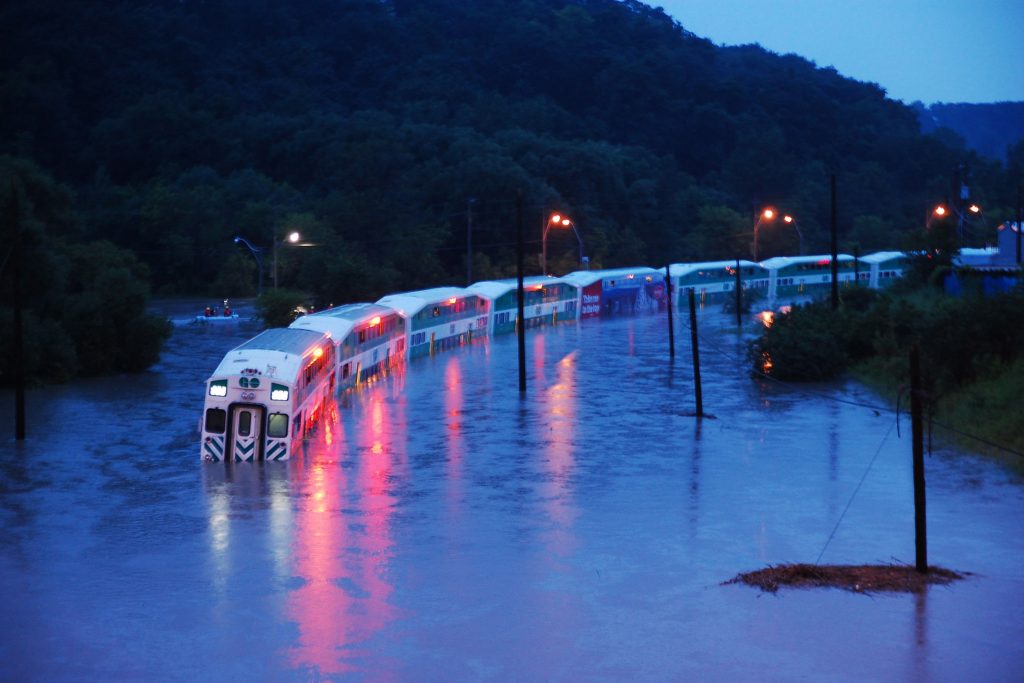1 Jan 2014
0 CommentsIce Storms Highlight Canada’s Obsolete Infrastructure
As we enter 2014, well into the 21st Century, one lesson for me from the year just past was that Canada seems to be hobbled with 19th century infrastructure. Let me explain.
During 2013, my home in Ontario was subject to not one, but two, different ice storms – in April and December. Both brought down large chunks of trees and both caused multi-day electrical power outages. In decades, this is the first time I can recall losing power for more than 1 day. To have this occur twice, with a combined 8 days of power outage, in a single year is even more striking.
After the first ice storm in April, I recall discussing this with a European colleague who was surprised by the very notion of a power outage. From a European perspective, he suggested the last power outage, of any length, that he could recall was 30 years ago. This started me thinking about why the difference.
In Canada, we have always prided ourselves on being one of the world’s richest countries, with modern infrastructure. However, much of our infrastructure was built for a different time and need. Much of it is really a testament to truly inventive Victorian design. It was indeed wonderful but no longer makes sense in the 21st Century. So, why indeed do we still have most of our electrical power lines above-ground on poles, while the rest of the (rich) world generally buries them? Why do our railways still rely on switches that freeze in winter and need to be operated by workers with propane torches? Why is a city like Toronto paralyzed by a major rainstorm?
Our homes, utilities, drainage and much more was built for a world predating our current period of rapid climate change. Surprisingly there remain in this world Luddites, who bizarrely continue to deny the fact of climate change. While we still have much to learn, on-the-ground results are here for all to see.
I gained significant insight into these issues when as a Director of Gore Mutual Insurance Company, a leading property insurer, I attended an enlightening presentation by the poignantly named Institute for Catastrophic Loss Reduction (ICLR). This industry-funded organization is a world leader, collaborating globally in research and advocacy around the causes and solutions for large scale insurance losses, known in industry jargon as a Catastrophe or even a Cat.
ICLR gathers data and works with many academic researchers to increase both understanding and awareness of what causes insurance losses. The data shows that the last ten years have seen huge increases in the number of severity of large scale losses, particularly from damaging wind, water and ice events, which are all significantly driven by climate change.
For example, with increased wind events (typically tornadoes in this area of Ontario), a call for more homes to be built with windows structurally rated to withstand 200 mph wind events makes sense.
Furthermore, climate change means that rainfall in 1 hour can equal what used to occur over 24 hours or more, with flash floods ensuing. In such an environment, instead of our historic practice of getting rid of water as quickly as possible, it is better to slow it down and buffer the potential for flash flooding.
For me, the power outages are a metaphor for how we in Canadian society need to look at our infrastructure with a sense of long term vision. We really need to invest to upgrade utilities, transportation and drainage for the needs of the 21st century. This in no way takes away from the heroic efforts of Hydro workers over the holiday season. I’m simply surprised that attention has never been focused on the root cause and long term prevention.
In an era of political infighting and embarrassing city Mayors, I’m wondering where the leadership necessary to achieve this will come from?
 A GO Train is stranded on flooded tracks in Toronto on Monday, July 8, 2013. THE CANADIAN PRESS/
A GO Train is stranded on flooded tracks in Toronto on Monday, July 8, 2013. THE CANADIAN PRESS/
.

8 Mar 2016
0 CommentsGo East Young Startup!
Building on 19th Century US westward expansion (“Go West Young Man”), much of the current innovation in technology has been West Coast focused, particularly in California’s Silicon Valley, which has for more than 50 years been an intellectual epicentre of the technology world.
Over my long tenure in the vanguard of technology trends, I have witnessed a tectonic shift in this comfortable, yet outdated, world order. Today the best and brightest innovators and entrepreneurs must also look east, especially to China, to fully embrace global reality of the 21st Century.
Many of you might be wondering about the slowing growth rates in China? Like many aspects of China, there are many perplexing contradictions that are beyond the scope of this post. It is certainly true that Chinese infrastructure investments and some manufacturing has been overbuilt. Not so in the technology industry. The difference is that there is a huge gap as the Chinese population increasingly moves to middle class status and the country needs to solve some huge issues (e.g. environmental issues around air quality). As a result, ICT, Green Technology, Life Sciences and other knowledge-based businesses continue to provide huge upside opportunities.
There is no question that China is a complex and difficult market to access. Knowing this, how can Canadian entrepreneurs master the new globalization landscape? Read on …
In 2015, my assistance was requested from an innovative group of investors and social entrepreneurs to pilot a new program, called CAMP (short for China Angel Mentorship Program) aimed at forging new international linkages tied to the momentum of startups. By identifying some of the best Canadian startup entrepreneurs, investing in them and helping them to engage with China, this program has the opportunity to drive a whole new generation of engagement between China and Canada, in the fast moving world of startups, technology and innovation.
CAMP is created and led by Liu Zhishuo (Peter Liu), Wang Tong (Tony Wang), Liu Yingna (Angela Liu), Zhang Yi Chin and Yang Jun (Alan Yang), all very savvy strategists and investors who aspire to “cross-border ecosystem building” between China and Canada. They work in Canada through CCAA (China Canada Angels Alliance) which made 23 investments in 2015 and in China through River Capital which made 50 investments in 2015. Since, as a westerner, you may not know these leaders (pictured below in Beijing), I will provide some background and context.
I was asked to help this core group from CCAA to help find a pivotal group of Canadian mentors, who were able to assist CCAA to shape the CAMP program and ensure that the most qualified cadre of startups were selected to fill the 2015 cohort. Many of us, including Aron Solomon, Peter Evans, Benton Leong, Chris Flood and yours truly were in Beijing to also assist in the work that was much more focused on the Chinese mentor group, many of whom are indicated at this link.
Now let’s turn to the CAMP framework. As a uniquely conceived variant of the classical “startup accelerator”, CAMP involves CCAA, along with the Canadian mentors, selecting the 10 best Canadian startups (initially restricted to Ontario) who are uniquely engaged with:
Because this was a first iteration, many companies had no idea of what to expect. Many were a bit sceptical, but being true entrepreneurs, they took the plunge. I can say that each and every startup from the first 2015 cohort of CAMP found the immersive experience in Beijing to be an exhaustingly intensive experience, but one that was profound and life-changing. The level of access to high level networks (“guanxi”) was extraordinary. That, coupled with the strategic insight of the CAMP organizers, and matched mentors, elevated the experience in Beijing.
Based on the inaugural CAMP, the organizers are committed to making the second cohort in 2016 even better. That call for the best startups will open up in the coming weeks. Until then, you might ask: why should you pay attention to CAMP and what sets it apart?
Access and Understanding: First of all, although China is a huge and growing market, it is very difficult for most companies, not the least a young startup, to properly engage with it. It is a complex market, fraught with pitfalls and unknown territory, from language, customs and even different regulation. CAMP provides personal connections (guanxi) through the mentors, and a degree of wisdom not likely to be available anywhere else. No company should consider China without a strong relationship with a trusted guide and mentor.
Canada-China Engagement: I firmly believe that CAMP has the potential to open up very senior intergovernmental engagement between China and Canada, but through the lens of building the new economy via innovative startups. Yet, startups have not historically been a major focus for governments at the national, provincial or regional level. I firmly believe that CAMP has sown the seeds that may increase bi-literal impact.
Huge Market Gaps: The unprecedented growth and transformation of China over the last quarter century has created huge demand and huge needs. Much has been written about that. But, less obvious, is that there are many companies in China looking for unique international opportunities. It is as challenging for them to engage outside China as it is for a Canadian company to understand China.
Growth Hacking: Perhaps the number one reason that startups go to California is to tap into the “growth hacking” expertise, an area in which Silicon Valley continues to be a world-beating innovator. Less well known in the west is that a new generation of Chinese tech firms, particularly in B2C and mobile, has taken growth hacking skills and strategies into hyperdrive. Surprising as it might seem, these may well make Silicon Valley growth vectors look tame by comparison. Every CAMP participant will have a unique opportunity to tap into this expertise.
Whether you are a startup with world-beating ambition or an tech ecosystem leader looking for future opportunities, stay tuned for the launch of the CAMP website, which will be accompanied by a call to find the 10 best startups Canada has to offer.